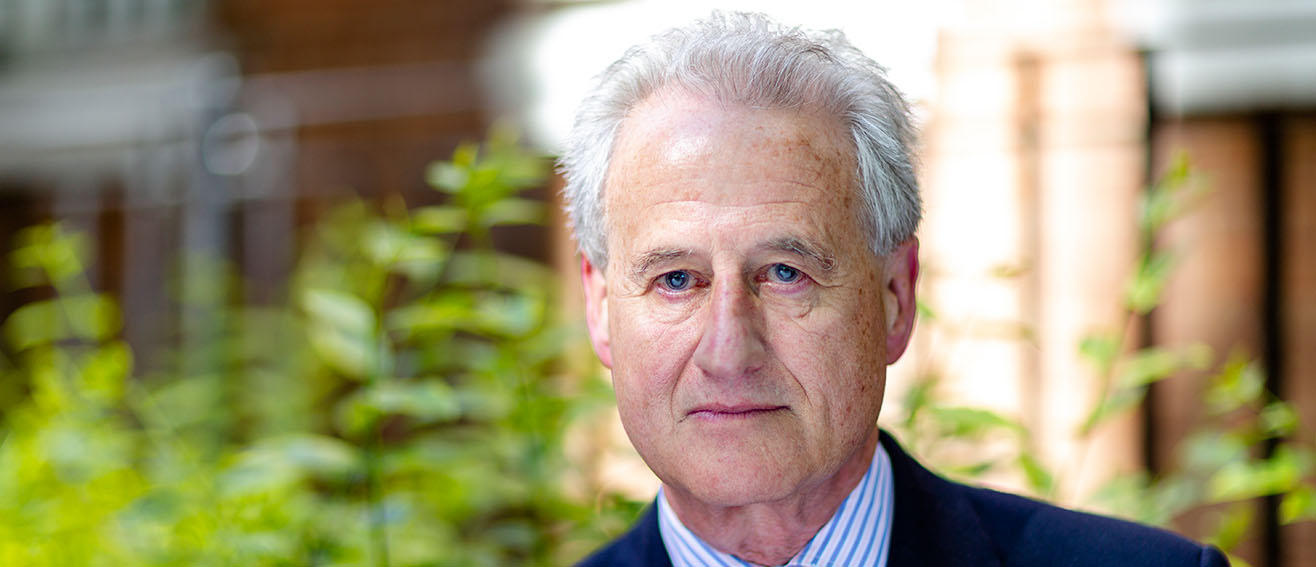
Col. Hugh Purcell OBE, Honorary Fellow
“In this world of portfolio careers, no one should ever stop learning”Colonel Hugh Purcell OBE DL has been awarded an honorary fellowship in the School of Built Environment and Architecture for his exceptional contribution to LSBU and in particular his support for our commitment to the Armed Forces Covenant. Following a distinguished military career, including several stints on operational duty, he spent 11 years as CEO of the Greater London and the City Reserve Forces’ & Cadets’ Associations. He remains closely involved both with the Associations and with a wide range of other youth organisations.
I’m a huge believer in the importance of lifelong learning. That’s one of the great things about being in the military. From the very start of my career as an officer in the Irish Guards, I’ve had so many wonderful opportunities, both on command and staff courses and later studying for a postgraduate diploma in international relations. Military service broadened my leadership and management skills and my horizons by introducing me to peoples and cultures I wouldn’t otherwise have come across. Today, in this world of portfolio careers, no one should ever stop learning. Apart from anything else, it’s good fun.
The key to effective leadership is to be yourself. When I was given command of the Duke of Edinburgh’s Royal Regiment, I was an outsider. They didn’t know me, and I didn’t know them. It was a challenging time in many ways. This was the early 1990s and the situation in Northern Ireland was extremely volatile. I’m sad to say we lost two good men in our final tour in 1993. The Regiment had also just been told it was soon to merge with the 1st Battalion the Gloucestershire Regiment. It’s a big shock to lose your name, lose your identity. The only thing you can do in that kind of situation is be true to yourself and trust your judgment. I’m very proud of what we achieved. The OBE is often jokingly described as ‘Other Buggers’ Efforts’, but that really is true in my case. I was lucky to work with such a fantastic team.
When I left the military, I needed to find a role that reflected my values.
Initially, I joined the Reserve Forces’ and Cadets’ Association to organise their 100th anniversary celebrations. I licked a lot of stamps! A consultancy with the Greater London Association followed, then the opportunity came up to apply for the CEO role. This was back in 2008. The recession was deepening and in discussions with my wife, we agreed that more needed to be done to upskill young people for tomorrow, or we would be in big trouble.
We have so much to gain from promoting greater engagement between the military and the rest of society. It has a hugely important role to play, particularly in reaching those young people that might otherwise fall by the wayside. Through my work with the Associations, with YOU London, which brings together uniformed youth organisations across the capital, and with the Motivational Preparation College for Training I can see the transformative power of offering young people a different route into work, into preparing themselves for adult life. With the Armed Forces Covenant, I think one of its most important functions is to raise awareness of the talent that’s out there, whether that’s among veterans, people who’ve been wounded or injured, or military spouses. Society needs all these people, their knowledge, skills and expertise.
Academic achievement is great, but it’s a narrow definition of success. I studied Classical Civilisation, Philosophy and Economics at Trinity College Dublin. That worked for me, but it’s not the only path. If the politicians hadn’t destroyed the polytechnic system, our society would be much more like Germany where if you’re an engineer, you’re at the very top of the tree. I’m a huge believer in vocational education. That’s why I was so keen to accept this award from LSBU. This is a place that really prizes practical, applied learning and entrepreneurship. And I believe that for many it’s the way forward.
My advice to new graduates? Be guided by what interests you, not just by money. I remember talking to a contemporary who was an accountant. I thought he had it all: the house, the car, the holidays, the kids at private school. But he hated his work. He was only doing it to maintain that lifestyle. Despite the challenges my career created for my supportive family, my goodness I’ve had an interesting working life. Always keep learning, keep looking forward, be open to constructive criticism and persevere.